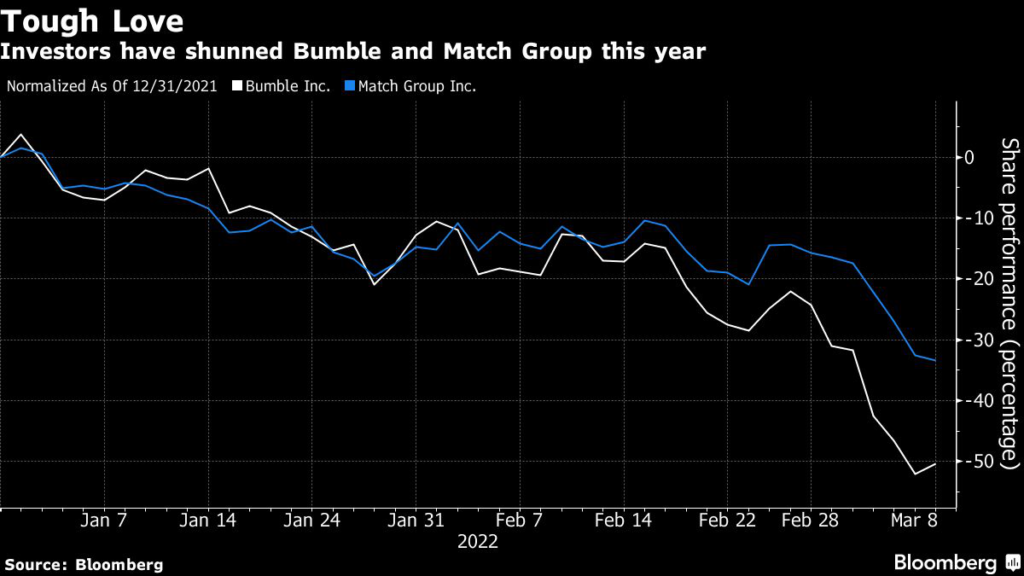(Bloomberg) — Bumble Inc. soared as much as 48% Wednesday, its biggest gain in more than a year, after the company gave an outlook for annual revenue that was more optimistic than the average Wall Street estimate.
The Austin, Texas-based dating app known for allowing women to make the first move said it expects revenue for the full year will be as much as $944 million, while analysts had projected $939 million.
“All in, we are more bullish on Bumble,” Evercore ISI analyst Shweta Khajuria wrote in a note to clients Wednesday. She noted that Bumble’s forecast for revenue growth on its core dating app of as much as 36% in 2022 is “meaningfully” higher than expected. “Bumble continues to execute well and the company is gaining market share,” she said.
Before the results were released Tuesday afternoon, the stock had slumped about 50%, hitting an all-time low as investors turned cautious over Bumble’s exposure to Russia and Ukraine. The stock soared as high as $24.62 in intraday trading on Wednesday in New York.
Bumble said it’s discontinuing operations in Russia and is removing the company’s apps from the Apple App Store and Google Play Store in Russia and Belarus. The full-year forecast includes a loss of $20 million in revenue from Russia, Ukraine and Belarus, which will mostly impact Bumble’s Badoo app. Combined sales from the three countries made up about 2.8% of Bumble’s annual revenue of $765.7 million. Almost all the revenue generated in the region came from the Badoo app, the company said Tuesday in a statement.
“Bumble’s outlook was better than feared,” and comes after a stock selloff that was “more in anticipation of muted guidance due to Badoo’s exposure to Russia,” Bloomberg Intelligence analyst Matthew Martino wrote in a note.
Badoo was founded by Russian-British entrepreneur Andrey Andreev in 2006 and is popular in Europe and Latin America. Bumble has a large portion of its engineering talent in Russia and Badoo, which accounts for 30% of Bumble’s total revenue, gets 12% of its monthly users from the country, Martino wrote in a note before results were released, citing data from Sensor Tower. Bumble said it employs 120 people in Moscow.
Bumble’ started to run into trouble in the third quarter, before the arrival of the highly contagious omicron variant. Even then, Badoo was reporting a decline in subscribers as its core user base of mostly urban, middle-class people was still facing economic pressures from the pandemic.
Badoo continued to struggle in the fourth quarter with revenue declining as omicron led to a disruption of traditional dating and social interaction. The number of paying users also fell, declining 6% to 1.34 million. “Covid has caused significant disruption to this user base, putting increased stress on their finances and their available free time,” Chief Executive Officer Whitney Wolfe Herd said on a conference call after the results were released.
The Covid-19 pandemic has produced ups and downs for Bumble and other popular dating apps, such as Match Group Inc.’s Tinder and Hinge. After initially being pummeled in the early days of the pandemic when lockdowns were enforced, an eventual return to live socializing and entertainment spurred users to spend more on dating subscriptions and make more in-app purchases. Many dating apps have also been expanding their purview to include sparking connections for platonic friendships.
In the fourth quarter, Bumble said revenue rose 26% to $208.2 million, falling short of analysts’ average estimate of $209.6 million. Total paying users grew 11% to 2.98 million, compared with analysts’ forecasts for 3 million. Bumble reported a loss of 8 cents per share, compared with analysts’ estimate of a loss of 1 cent.
More stories like this are available on bloomberg.com
©2022 Bloomberg L.P.











